人教版高中英语选修6 unit 5 the power of nature - Grammar现在分词作状语课件 (共32张PPT)
文档属性
| 名称 | 人教版高中英语选修6 unit 5 the power of nature - Grammar现在分词作状语课件 (共32张PPT) | 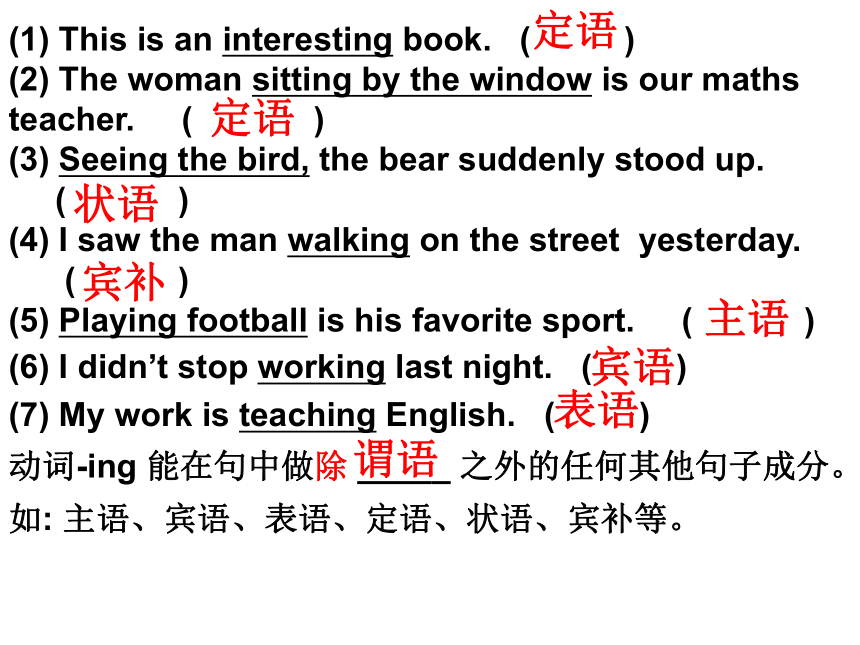 | |
| 格式 | zip | ||
| 文件大小 | 365.4KB | ||
| 资源类型 | 教案 | ||
| 版本资源 | 人教版(新课程标准) | ||
| 科目 | 英语 | ||
| 更新时间 | 2019-01-21 10:31:10 | ||
图片预览


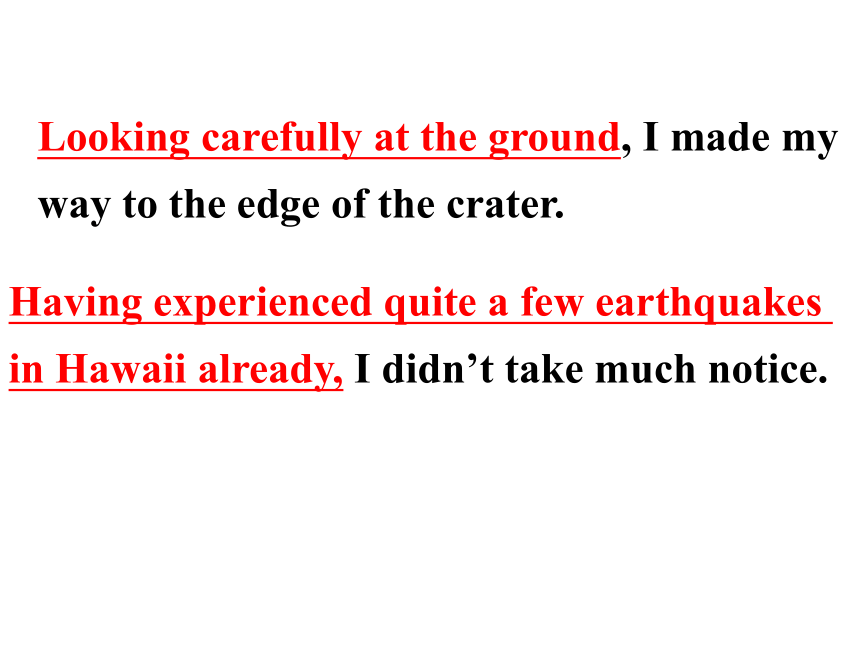

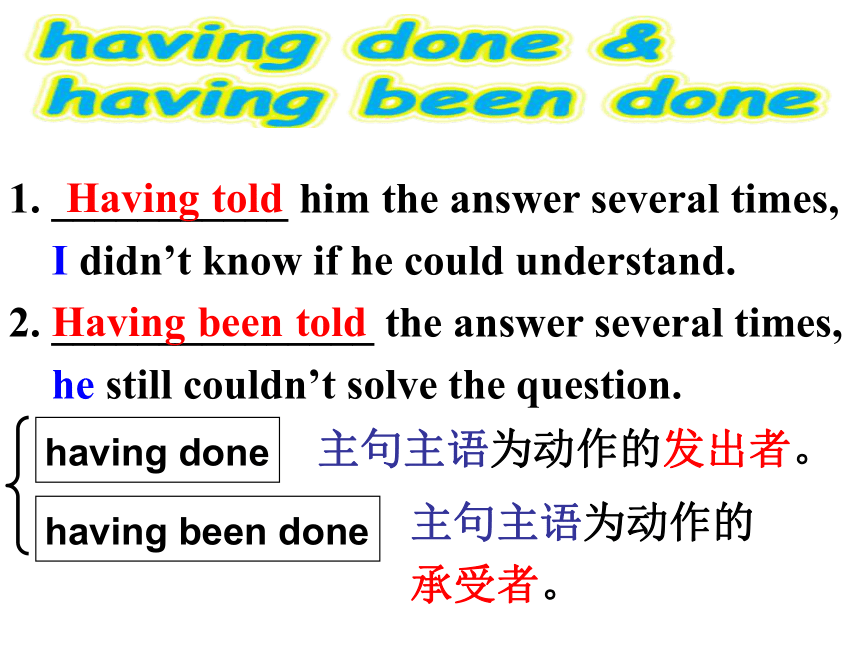
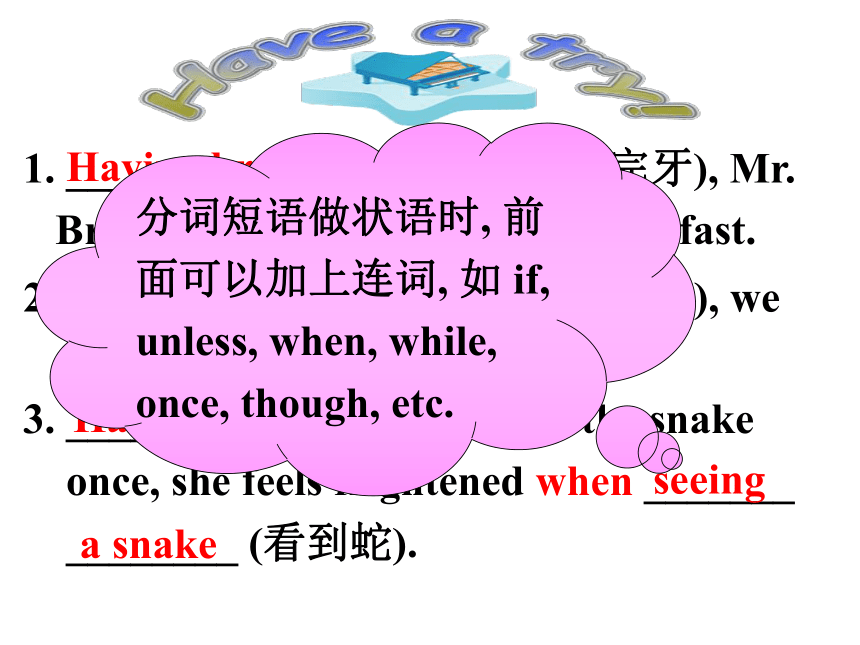
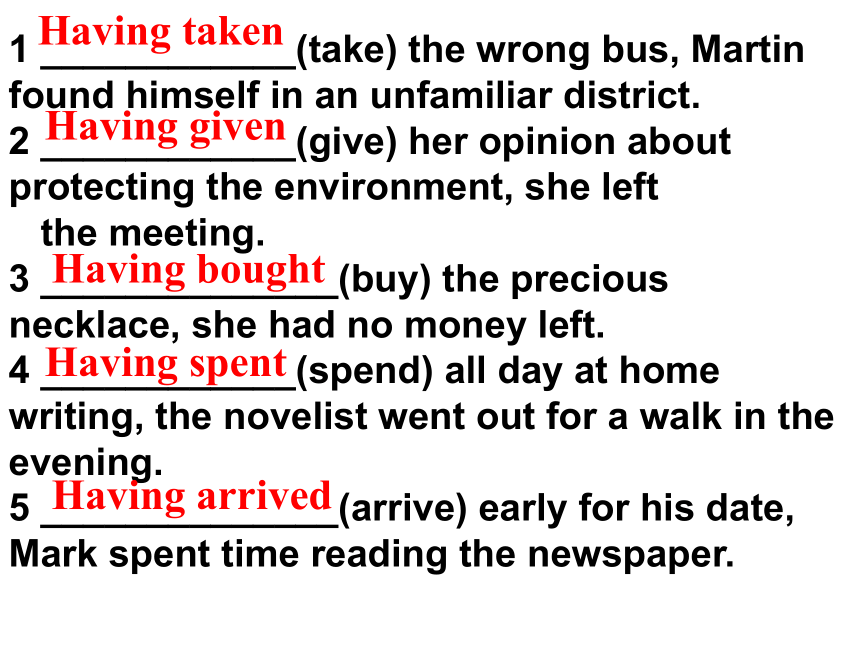
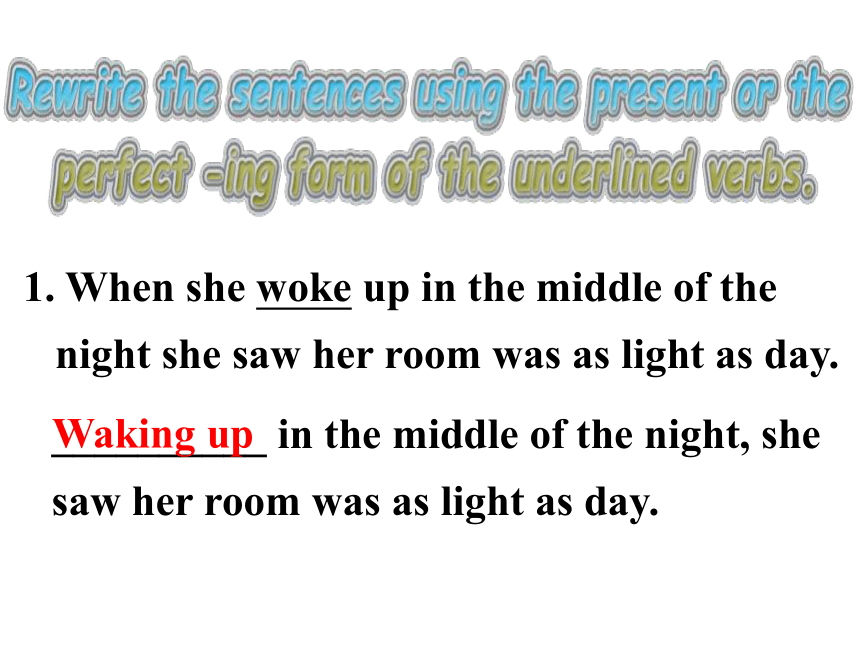
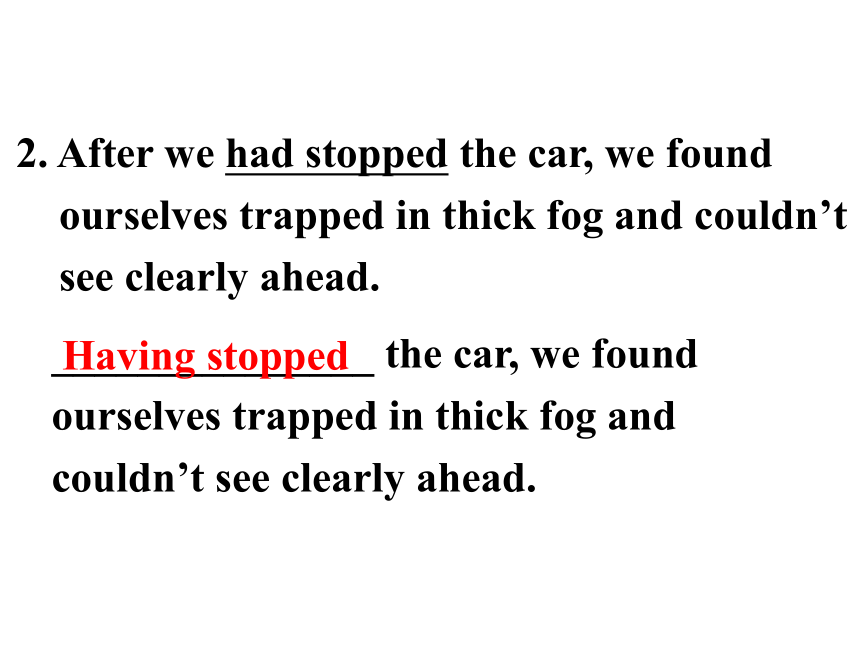
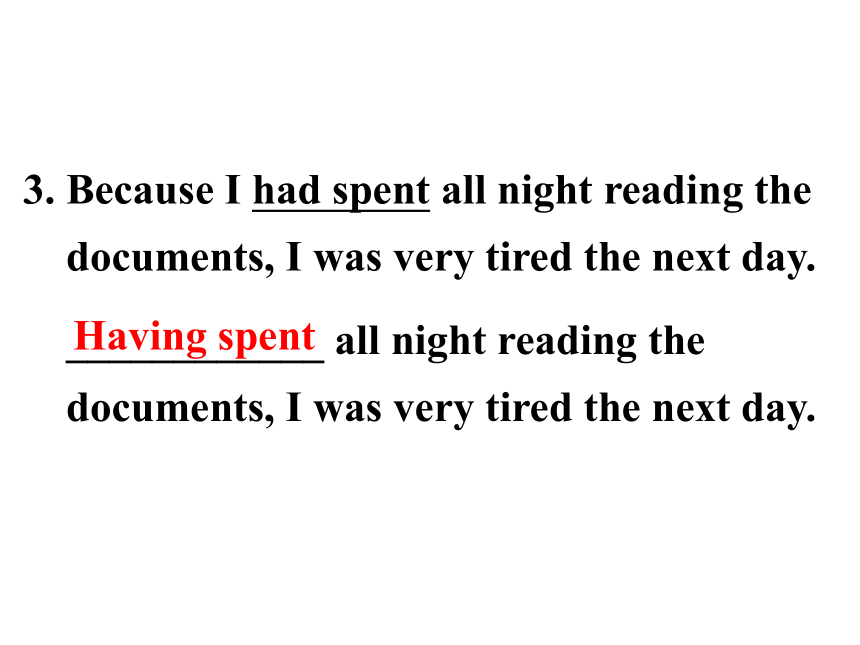
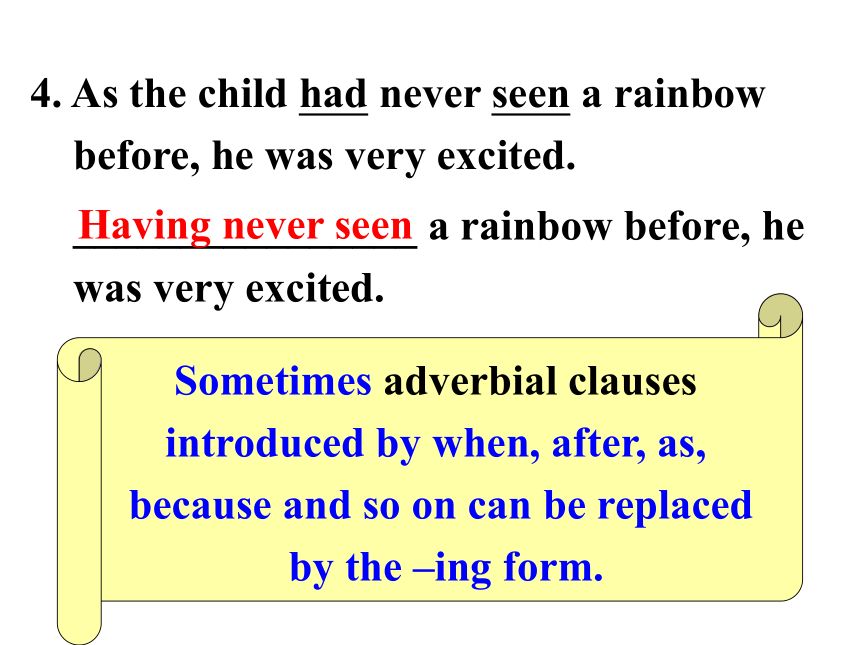
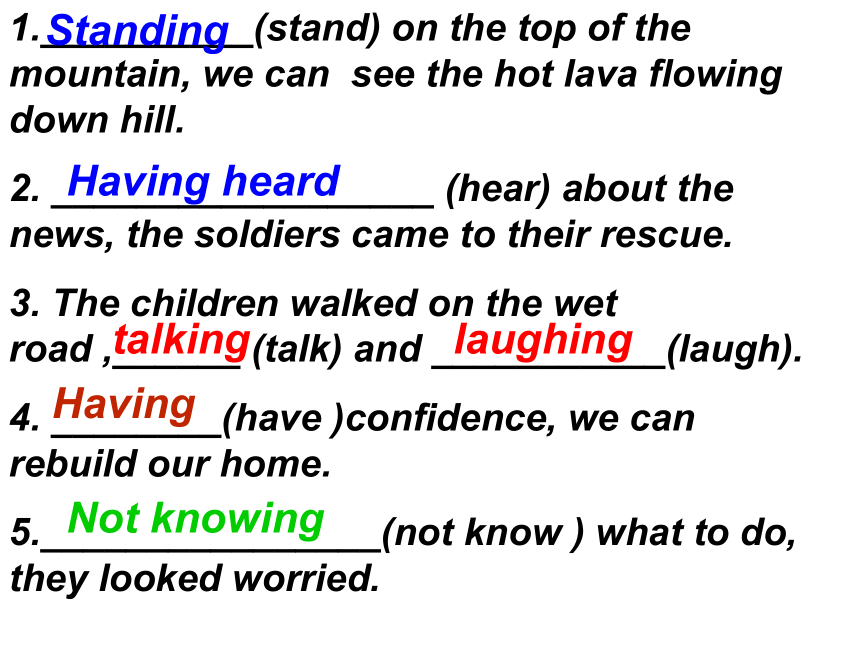
文档简介
课件32张PPT。(1) This is an interesting book. ( )
(2) The woman sitting by the window is our maths teacher. ( )
(3) Seeing the bird, the bear suddenly stood up.
( )
(4) I saw the man walking on the street yesterday.
( )
(5) Playing football is his favorite sport. ( )
(6) I didn’t stop working last night. ( )
(7) My work is teaching English. ( )
动词-ing 能在句中做除 _____ 之外的任何其他句子成分。如: 主语、宾语、表语、定语、状语、宾补等。
定语定语状语宾补 主语宾语表语谓语Looking carefully at the ground, I made my
way to the edge of the crater.Having experienced quite a few earthquakes
in Hawaii already, I didn’t take much notice.1. Having written the letter, John went to
the post office.
2. Seeing the beautiful sight, the children
felt excited. V-ingdoinghaving done表动作先发生表动作同时/几乎发生1. ___________ him the answer several times,
I didn’t know if he could understand.
2. _______________ the answer several times,
he still couldn’t solve the question.Having toldHaving been toldhaving done主句主语为动作的发出者。主句主语为动作的承受者。having been done3. _________________ (咬) by the snake
once, she feels frightened when _______
________ (看到蛇).2. ________________ (听到这个消息), we
got excited.1. ______________________ (刷完牙), Mr.
Brown came downstairs for breakfast.Having brushed his teethHearing the newsHaving been bittenseeing分词短语做状语时, 前面可以加上连词, 如 if, unless, when, while, once, though, etc.
a snake1 ____________(take) the wrong bus, Martin found himself in an unfamiliar district.
2 ____________(give) her opinion about protecting the environment, she left
the meeting.
3 ______________(buy) the precious necklace, she had no money left.
4 ____________(spend) all day at home writing, the novelist went out for a walk in the evening.
5 ______________(arrive) early for his date, Mark spent time reading the newspaper.Having takenHaving givenHaving boughtHaving spentHaving arrived1. When she woke up in the middle of the night she saw her room was as light as day.__________ in the middle of the night, she
saw her room was as light as day.Waking up2. After we had stopped the car, we found
ourselves trapped in thick fog and couldn’t
see clearly ahead._______________ the car, we found ourselves trapped in thick fog and couldn’t see clearly ahead.Having stopped3. Because I had spent all night reading the
documents, I was very tired the next day.
____________ all night reading the documents, I was very tired the next day.
Having spent4. As the child had never seen a rainbow
before, he was very excited.________________ a rainbow before, he was very excited.Having never seenSometimes adverbial clauses
introduced by when, after, as,
because and so on can be replaced
by the –ing form.1.__________(stand) on the top of the mountain, we can see the hot lava flowing down hill.
2. __________________ (hear) about the news, the soldiers came to their rescue.
3. The children walked on the wet road ,______ (talk) and ___________(laugh).
4. ________(have )confidence, we can rebuild our home.
5.________________(not know ) what to do, they looked worried.
StandingHaving heard talkinglaughingHavingNot knowingRead the following sentences and discover the useful structures :a. The children ran out of the room,
laughing and talking.
b. Seeing nobody at home, she decided
to leave them a note.2. a. Having eaten too much for supper, he
couldn‘t go to sleep.
b. Having worked with the foreigners for
years, I knew them very well.3. a. Not knowing her phone number,
we couldn‘t get in touch with her.
5. a.The boy leading the way, we had no
trouble finding the strange cave.
b. There being no further business
to discuss, we all went home. 现在分词作状语:时间,条件,让步, 伴随,
方式,原因,结果 4. a. When visiting the Great Wall, they make
a side trip to the nearby villages.
b. Though living near her house, I seldom
see her these days. b. Not having received a reply, he decided
to write another letter.1.时间状语:
1). Working in the factory, he learned a lot from the workers.
2).Having read the letter, she got very excited.注①:现在分词作时间,原因状语:如果分词所表示的动作和谓语的动作同时发生或几乎同时发生,用现在分词的一般式。如果分词动作明显在谓语之前发生,用现在分词的完成式。3).Hearing the news, they all jumped with joy.
4).Having arrived at the factory, they immediately set to work.在作时间状语的分词前,可加连词while, when,介词after, before, on/upon. 比如:
1.Be careful when crossing the street.
2. Don’t mention this while talking to
him.
3.On/Upon arriving in London, he
managed to get in touch with her.
=As soon as he arrived in London, …
1).Working hard, you will succeed.
2).Turning to the left, you will find the path leading to the site.
2.现在分词作条件状语:= If you work hard , you will succeed .= Work hard , and you will succeed .3.现在分词作伴随方式状语:1).She came running towards me.
2).They stood there for an hour ,watching
the game.
3).She sat at the desk reading a newspaper.
4).Traveling by jeep, we visited a number
of cities.
5).Following the guide, they started to
climb.4.现在分词作原因状语:1).Seeing nobody at home, she decided to leave them a note.
2).Not knowing her address, we couldn’t get in touch with her.
3).Being so poor in those days, we couldn’t afford to send the boy to hospital.
注:4).Having worked among the peasants for many years, he knew them very well.(分词完成式的肯定式)
5). Not having received an answer, he decided to
write another letter.(分词完成式的否定式)
________________(not know ) what to do, they looked worried._______________(study) the volcanoes for so many years, he knows them very well.Not knowingHaving studied5.现在分词作结果状语: (多用于句尾)
Her husband died in 1942, leaving her with five children.
The bus was held up by snowstorm, thus causing the delay. He was caught in the rain, thus making himself catch cold.I hurried to school, only to find that it was Sunday.Note: 现在分词表示必然结果,前可加thus,不定式表意外的结果,前可加only.1.It has been raining heavily, ________ (cause) big floods in this area.
2.A big earthquake attacked the city, _________(damage) the bridge badly.
damagingcausingWalking along the street, I met Mary.
(= While I was walking along the street….)
Being tired, I stopped to take a rest.
(= Because I was tired, ….)
Turning to the left, you will find the school.
(= If you turn to the left, ….)
Knowing where I live, he never come to see me .
(= Though he knows where I live, ….)
I stood there, waiting for her.
(= …, and waited for her.)
It rained heavily, causing severe flooding in the area.
(= It rained heavily so that it caused severe flooding in the area.)1.?_____?(live)?in?a?southern?city?of?China,?I?have?never?seen?such?a?wonderful?snow?view. 2.?________________?(not?grow)?up?yet,?you’re?not?allowed?to?enter?the?bars. 3.?_________?(Know)?all?this,?they?made?me?pay?for?the?damage. 4.?The?students?are?sitting?in?the?reading-room, ________?(read)?all?kinds?of?books. 请用括号里所给动词的适当形式填空: Living? Not?having?grown? Knowing? reading 对比练习:
1. ________many times , but he still couldn't understand it .
2. ________many times , he still couldn't understand it . A. Having been told B. Told? C. He was told D. Though he had
told
3. ______from space , the earth looks blue .
4.______from space , we can see the earth is blue . A. Seen B. Seeing C. To see D.See
? CAAB根据汉语意思,用动词--ing形式(短语)将下列句子补充完整。(每空一词)1. 由于生病,我不得不呆在家里。
_____ __ , I had to stay at home.
2. 他把咖啡杯掉在地上,摔得粉碎。
He dropped the coffee cup, ________ _
____ ______ .
3. 过马路的时候要小心些。
When ________ ___ _____, please be
careful.
4. 听到这个消息我们都高兴的跳了起来。
______ ___ _____, we all jumped with joy. Being illHearing the newscrossing the roadbreaking it
into pieces 5.杰克完成作业后,外出散步。
______ _______ ___ _________, Jack went out for a walk.
6.由于不知道她的地址,我没法给她写信。
___ _______ ___ _______, I can't write to her.
7. 他们坐在花园里谈论一起度过的日子。
They sat in the garden,______ _____ ___ ___ they spent together.
8. 从山上看, 我们发现这湖泊更加漂亮了。
______ _____ ___ ____, we find that the lake looks more beautiful.
Having finished his homeworkNot knowing her addresstalking about the day
Seeing from the hill
If time permits, we will go hiking.Time permitting, we will go hiking.
Because the wind is too strong, they can’t walk smoothly.The wind (being) too strong, they can’t walk smoothlyNote: 在用分词短语作状语时, 它逻辑上的主语一般必须与句子的主语一致, 如不一致则要加上它自己逻辑上的主语, 这种结构称为:独 立主格 结 构
I.名词 / 代词主格 + 现在分词 :名词 / 代词是现在动分词动作的执行者,即:主动关系。1. The Night coming on ,they started for home.
2. The last bus having gone, he had to walk home.
3. Time permitting, we are going to climb the mountain tomorrow.
4. They are talking with the teacher, their children playing outside.
5. It raining, I went to work with an umbrella.II.名词 / 代词主格 + 过去分词 :名词 / 代词是过去分词动作的承受者,即:动宾关系。1.His tea finished, he went on with his work.(时间)
2. His homework done, he went to watch the game.
3. His leg badly hurt, he had to be sent to hospital. (原因)
4. The report read, discussion began.III.名词 / 代词主格 + (being) + adj./adv./ prep-phrase /n . /to do (名词 / 代词是不定式动作的执行者,且强调的是一次具体的动作。)
1.They said good-bye to each other , one to
go home , the other to go to the bookstore.
2. Everything (being) ready, they started out.
3. The meeting (being) over,we all left the hall.
4. WuSong beat the tiger to death, two fists (being) his only weapon.
5. Gun in hand, the soldiers ran up the hill.
6. Here are the first two volumes, the third one to come out next month.注意:非谓语动词的否定形式不管其结构如何,只需在其前直接加not / never ,即:not / never + 非谓语动词.Not having finished his homework, the
boy was still doing it in the classroom.
(2) The woman sitting by the window is our maths teacher. ( )
(3) Seeing the bird, the bear suddenly stood up.
( )
(4) I saw the man walking on the street yesterday.
( )
(5) Playing football is his favorite sport. ( )
(6) I didn’t stop working last night. ( )
(7) My work is teaching English. ( )
动词-ing 能在句中做除 _____ 之外的任何其他句子成分。如: 主语、宾语、表语、定语、状语、宾补等。
定语定语状语宾补 主语宾语表语谓语Looking carefully at the ground, I made my
way to the edge of the crater.Having experienced quite a few earthquakes
in Hawaii already, I didn’t take much notice.1. Having written the letter, John went to
the post office.
2. Seeing the beautiful sight, the children
felt excited. V-ingdoinghaving done表动作先发生表动作同时/几乎发生1. ___________ him the answer several times,
I didn’t know if he could understand.
2. _______________ the answer several times,
he still couldn’t solve the question.Having toldHaving been toldhaving done主句主语为动作的发出者。主句主语为动作的承受者。having been done3. _________________ (咬) by the snake
once, she feels frightened when _______
________ (看到蛇).2. ________________ (听到这个消息), we
got excited.1. ______________________ (刷完牙), Mr.
Brown came downstairs for breakfast.Having brushed his teethHearing the newsHaving been bittenseeing分词短语做状语时, 前面可以加上连词, 如 if, unless, when, while, once, though, etc.
a snake1 ____________(take) the wrong bus, Martin found himself in an unfamiliar district.
2 ____________(give) her opinion about protecting the environment, she left
the meeting.
3 ______________(buy) the precious necklace, she had no money left.
4 ____________(spend) all day at home writing, the novelist went out for a walk in the evening.
5 ______________(arrive) early for his date, Mark spent time reading the newspaper.Having takenHaving givenHaving boughtHaving spentHaving arrived1. When she woke up in the middle of the night she saw her room was as light as day.__________ in the middle of the night, she
saw her room was as light as day.Waking up2. After we had stopped the car, we found
ourselves trapped in thick fog and couldn’t
see clearly ahead._______________ the car, we found ourselves trapped in thick fog and couldn’t see clearly ahead.Having stopped3. Because I had spent all night reading the
documents, I was very tired the next day.
____________ all night reading the documents, I was very tired the next day.
Having spent4. As the child had never seen a rainbow
before, he was very excited.________________ a rainbow before, he was very excited.Having never seenSometimes adverbial clauses
introduced by when, after, as,
because and so on can be replaced
by the –ing form.1.__________(stand) on the top of the mountain, we can see the hot lava flowing down hill.
2. __________________ (hear) about the news, the soldiers came to their rescue.
3. The children walked on the wet road ,______ (talk) and ___________(laugh).
4. ________(have )confidence, we can rebuild our home.
5.________________(not know ) what to do, they looked worried.
StandingHaving heard talkinglaughingHavingNot knowingRead the following sentences and discover the useful structures :a. The children ran out of the room,
laughing and talking.
b. Seeing nobody at home, she decided
to leave them a note.2. a. Having eaten too much for supper, he
couldn‘t go to sleep.
b. Having worked with the foreigners for
years, I knew them very well.3. a. Not knowing her phone number,
we couldn‘t get in touch with her.
5. a.The boy leading the way, we had no
trouble finding the strange cave.
b. There being no further business
to discuss, we all went home. 现在分词作状语:时间,条件,让步, 伴随,
方式,原因,结果 4. a. When visiting the Great Wall, they make
a side trip to the nearby villages.
b. Though living near her house, I seldom
see her these days. b. Not having received a reply, he decided
to write another letter.1.时间状语:
1). Working in the factory, he learned a lot from the workers.
2).Having read the letter, she got very excited.注①:现在分词作时间,原因状语:如果分词所表示的动作和谓语的动作同时发生或几乎同时发生,用现在分词的一般式。如果分词动作明显在谓语之前发生,用现在分词的完成式。3).Hearing the news, they all jumped with joy.
4).Having arrived at the factory, they immediately set to work.在作时间状语的分词前,可加连词while, when,介词after, before, on/upon. 比如:
1.Be careful when crossing the street.
2. Don’t mention this while talking to
him.
3.On/Upon arriving in London, he
managed to get in touch with her.
=As soon as he arrived in London, …
1).Working hard, you will succeed.
2).Turning to the left, you will find the path leading to the site.
2.现在分词作条件状语:= If you work hard , you will succeed .= Work hard , and you will succeed .3.现在分词作伴随方式状语:1).She came running towards me.
2).They stood there for an hour ,watching
the game.
3).She sat at the desk reading a newspaper.
4).Traveling by jeep, we visited a number
of cities.
5).Following the guide, they started to
climb.4.现在分词作原因状语:1).Seeing nobody at home, she decided to leave them a note.
2).Not knowing her address, we couldn’t get in touch with her.
3).Being so poor in those days, we couldn’t afford to send the boy to hospital.
注:4).Having worked among the peasants for many years, he knew them very well.(分词完成式的肯定式)
5). Not having received an answer, he decided to
write another letter.(分词完成式的否定式)
________________(not know ) what to do, they looked worried._______________(study) the volcanoes for so many years, he knows them very well.Not knowingHaving studied5.现在分词作结果状语: (多用于句尾)
Her husband died in 1942, leaving her with five children.
The bus was held up by snowstorm, thus causing the delay. He was caught in the rain, thus making himself catch cold.I hurried to school, only to find that it was Sunday.Note: 现在分词表示必然结果,前可加thus,不定式表意外的结果,前可加only.1.It has been raining heavily, ________ (cause) big floods in this area.
2.A big earthquake attacked the city, _________(damage) the bridge badly.
damagingcausingWalking along the street, I met Mary.
(= While I was walking along the street….)
Being tired, I stopped to take a rest.
(= Because I was tired, ….)
Turning to the left, you will find the school.
(= If you turn to the left, ….)
Knowing where I live, he never come to see me .
(= Though he knows where I live, ….)
I stood there, waiting for her.
(= …, and waited for her.)
It rained heavily, causing severe flooding in the area.
(= It rained heavily so that it caused severe flooding in the area.)1.?_____?(live)?in?a?southern?city?of?China,?I?have?never?seen?such?a?wonderful?snow?view. 2.?________________?(not?grow)?up?yet,?you’re?not?allowed?to?enter?the?bars. 3.?_________?(Know)?all?this,?they?made?me?pay?for?the?damage. 4.?The?students?are?sitting?in?the?reading-room, ________?(read)?all?kinds?of?books. 请用括号里所给动词的适当形式填空: Living? Not?having?grown? Knowing? reading 对比练习:
1. ________many times , but he still couldn't understand it .
2. ________many times , he still couldn't understand it . A. Having been told B. Told? C. He was told D. Though he had
told
3. ______from space , the earth looks blue .
4.______from space , we can see the earth is blue . A. Seen B. Seeing C. To see D.See
? CAAB根据汉语意思,用动词--ing形式(短语)将下列句子补充完整。(每空一词)1. 由于生病,我不得不呆在家里。
_____ __ , I had to stay at home.
2. 他把咖啡杯掉在地上,摔得粉碎。
He dropped the coffee cup, ________ _
____ ______ .
3. 过马路的时候要小心些。
When ________ ___ _____, please be
careful.
4. 听到这个消息我们都高兴的跳了起来。
______ ___ _____, we all jumped with joy. Being illHearing the newscrossing the roadbreaking it
into pieces 5.杰克完成作业后,外出散步。
______ _______ ___ _________, Jack went out for a walk.
6.由于不知道她的地址,我没法给她写信。
___ _______ ___ _______, I can't write to her.
7. 他们坐在花园里谈论一起度过的日子。
They sat in the garden,______ _____ ___ ___ they spent together.
8. 从山上看, 我们发现这湖泊更加漂亮了。
______ _____ ___ ____, we find that the lake looks more beautiful.
Having finished his homeworkNot knowing her addresstalking about the day
Seeing from the hill
If time permits, we will go hiking.Time permitting, we will go hiking.
Because the wind is too strong, they can’t walk smoothly.The wind (being) too strong, they can’t walk smoothlyNote: 在用分词短语作状语时, 它逻辑上的主语一般必须与句子的主语一致, 如不一致则要加上它自己逻辑上的主语, 这种结构称为:独 立主格 结 构
I.名词 / 代词主格 + 现在分词 :名词 / 代词是现在动分词动作的执行者,即:主动关系。1. The Night coming on ,they started for home.
2. The last bus having gone, he had to walk home.
3. Time permitting, we are going to climb the mountain tomorrow.
4. They are talking with the teacher, their children playing outside.
5. It raining, I went to work with an umbrella.II.名词 / 代词主格 + 过去分词 :名词 / 代词是过去分词动作的承受者,即:动宾关系。1.His tea finished, he went on with his work.(时间)
2. His homework done, he went to watch the game.
3. His leg badly hurt, he had to be sent to hospital. (原因)
4. The report read, discussion began.III.名词 / 代词主格 + (being) + adj./adv./ prep-phrase /n . /to do (名词 / 代词是不定式动作的执行者,且强调的是一次具体的动作。)
1.They said good-bye to each other , one to
go home , the other to go to the bookstore.
2. Everything (being) ready, they started out.
3. The meeting (being) over,we all left the hall.
4. WuSong beat the tiger to death, two fists (being) his only weapon.
5. Gun in hand, the soldiers ran up the hill.
6. Here are the first two volumes, the third one to come out next month.注意:非谓语动词的否定形式不管其结构如何,只需在其前直接加not / never ,即:not / never + 非谓语动词.Not having finished his homework, the
boy was still doing it in the classroom.
